[Ed. note: As you will see, Dr. Stancel is an exotics veterinarian, though his practice is not limited to birds and reptiles. Although the article is about animals in general, reptile owners as well should take note of how things will go when bringing their geckos or other lizards in for a vet appointment]
Working in the veterinary field, whether you are a veterinarian, veterinary technician, receptionist etc, is a hard and stressful job. There is a great deal that goes on behind the scenes that clients never know about or see. Adding a worldwide viral pandemic that is killing many people only makes that job even harder and more stressful. We are expected to be at work every day due to being considered essential employees and we, as veterinarians, took an oath to be there for our patients, so we are.
Most veterinary hospitals, and possibly all of them, have taken the same steps to help reduce our chances of exposure to the virus while still being able to provide the veterinary care our patients need.
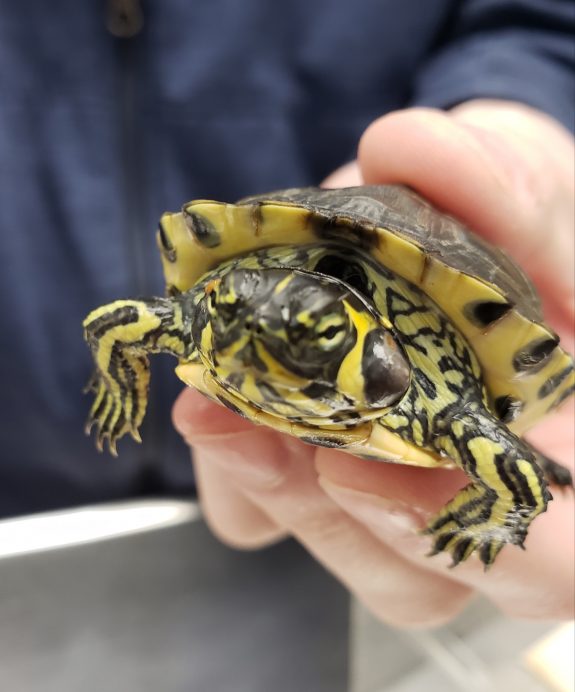
When you come for an appointment
The main thing that most veterinary hospitals are doing is only allowing the pets in and not the owners. A technician will meet the client at the door, bring the pet in and the exam process will start from there. Communication with clients is done over the phone to discuss findings and the next steps. Even though this system works fine, there are a few drawbacks. One main drawback is the fact that it takes longer than usual to get through an appointment. The client needs to be called, the pet has to wait to go back to the owner until any medications are ready or until the receptionists check the client out all while trying to answer the busy phone ringing from other clients. Not being able to move on to the next appointment until the prior pet is back with the owner and the tech is free to help slows us down quite a bit. All that plus a fully booked day just adds to the hectic nature of the work.
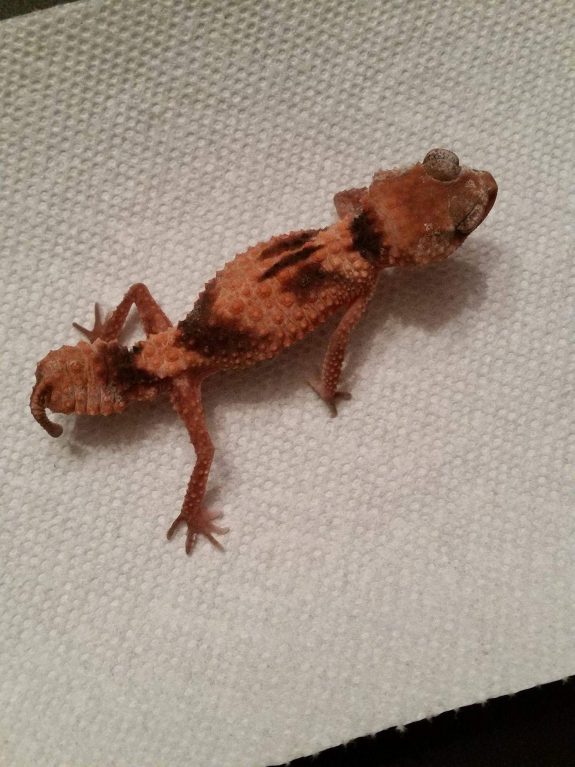
There is one exception to not letting clients in and that is euthanasia. We are allowing one family member in the building, but many places are not allowing clients in at all for them. Euthanasia is a difficult time for the owners and the veterinarian. Not all family members being allowed to be present during this difficult time with their beloved pet makes it even more difficult. Having a face mask on during the process, keeping your distance and not being able to hug and console the client makes it very impersonable and tougher.
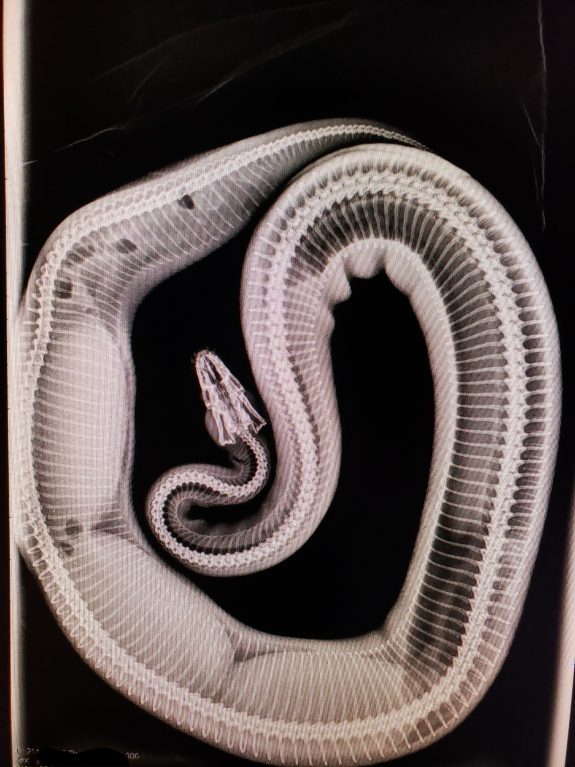
We have found many instances in which clients did not agree with the system we are using. Some clients have not been happy about not being allowed in with their pets. This system has even stopped some owners from bringing their pets in even while being sick and needing to be seen by a veterinarian. We would like for our clients to understand that we want to be there for them and their pets, but during this time our staff’s health and safety is our main concern. We are putting ourselves at risk of exposure and trying to limit that as best as we can so we can still be there for their pets.
The difficulties of personal protection
Another important step is the use of proper personal protective equipment (PPE). This includes wearing a face mask and gloves when needed. The mask is worn all day to limit exposure not only to clients but to each other as well. Wearing a mask all day while running around the clinic, restraining an animal for whatever procedure we are doing just adds to the daily exhaustion we go through. Social distance among employees is also kept whenever possible, but often limited when in an exam room due to limited space, having a technician holding the animal while is being examined, getting shots, getting blood drawn, etc. Hands are washed after every patient according to the CDC guidelines. The exam tables and cages are cleaned as usual with the proper disinfectants, but they are then followed with a dilute bleach solution as an extra step to further kill any possible germs.
Veterinarians on the frontlines
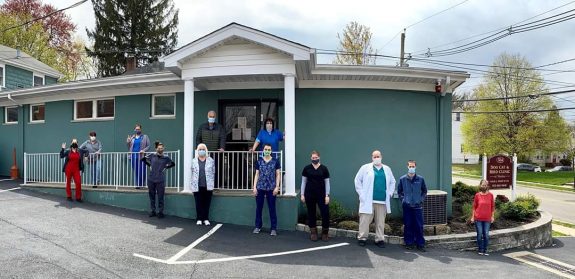
As far as our direct involvement in providing any health care for humans in time of need, the state requested a full list of our PPE along with what anesthesia machines, ventilators and IV pumps we had in case the state needed them. At one point, veterinarians and technicians were called upon to volunteer our services to help the overwhelmed hospitals during this time of need.
Even though we love what we do, working in the veterinary field is an incredibly stressful job. Adding in the stress of this pandemic only made it worse. We dedicate our lives for these animals and will go through great ends to fulfill their needs in medicine. Although many veterinary hospitals and clinics may be closed, a vast majority of them are still open for your pets, whether they are dogs or cats, or even birds, reptiles and other exotics. Do not assume they are closed due to the pandemic. There are many places still open with caring hands and hearts ready to help your pet.
In closing I would like to thank all those in the veterinary field that are still hard at work every day. We are often the forgotten ones that put ourselves in the forefront to help animals’ lives every day. We do get those “thank you for being there for us” at times from clients, but not enough compared to how hard we all work every day.
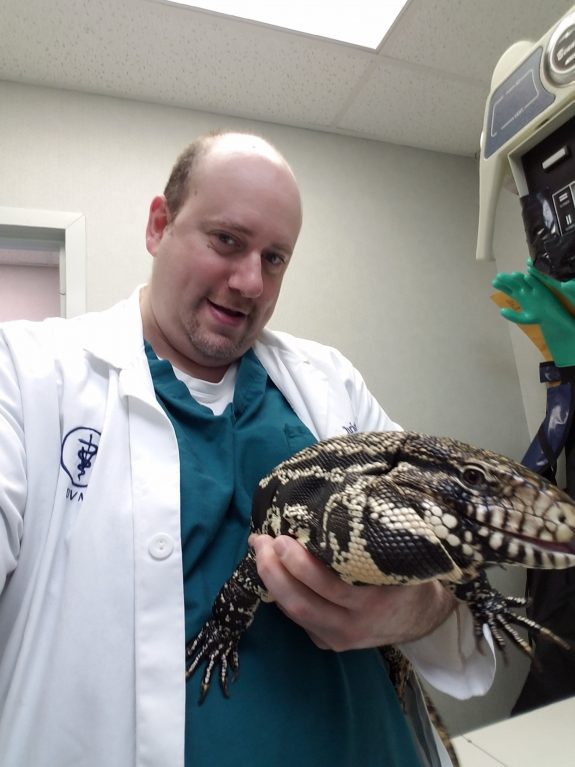
More about Dr. Stancel
Dr. Christopher Stancel DVM originally grew up in Nutley, New Jersey and always knew he wanted to be a veterinarian. While attending high school and college he worked for a local pet store, a farm, and a small zoo in the Newark Museum where he loved caring for the animals. He graduated from Rutgers University- Cook College with a B.S. in Animal Science. Approximately 3 years prior to attending veterinary school, Dr. Stancel worked for the Dog, Cat & Bird Clinic of Nutley as a veterinary technician. There he gained not only a wealth of knowledge of veterinary medicine but also close relation with Dr. Crupi and his wife. Dr. Stancel graduated from Ross University School of Veterinary Medicine in January 2004. While there he received multiple community service awards as Vice President/President, Website manager and treasurer of People for the Animal Welfare on St. Kitts (P.A.W.S) before completing his last clinical year at Louisiana State University. During his clinic year he received a large amount of training in the field of Avian, Exotic, Wildlife and Zoo medicine. As a veterinarian, he worked at Central Veterinary Associates in NY followed by the Ridgewood Veterinary Hospital in NJ. In 2013, Dr Stancel decided to rejoin the family at the Dog, Cat & Bird Clinic of Nutley but this time as a fellow veterinarian.
Dr. Stancel tends to dogs and cats but has a focus on Avian and Exotic Medicine and would like to complete board certification in Avian, Reptile and Exotic Mammal Medicine. He also has a special interest in surgery, endoscopy and ultrasound.
Dr. Stancel’s professional memberships include the Association of Avian Veterinarians, Association of Reptile and Amphibian Veterinarians, Association of Exotic Mammal Veterinarians, Association of Sugar Glider Veterinarians, New Jersey Veterinary Medical Association, and American Veterinary Medical Association.
Dr. Stancel has written several published journal articles:
- Calcium and Phosphorous Supplementation Decreases Growth, but Does Not Induce Pyramiding, in Young Red-Eared Sliders, Trachemys scripta elegans. Zoo Biology. Vol. 17 Issue 1. Pages 17-24. Dec. 1998.
- Renal Adenocarcinoma in a Bearded Dragon. Exotic DVM. Vol. 12 Issue 1. Pages 29 – 31. 2010
- Congenital Cardiomegaly in a Boa Constrictor. Exotic DVM. Vol. 12 Issue 1. Page 4. 2010
Dr. Stancel and his wife Maria (a fellow veterinary technician) have a spunky chihuahua named Dobby, two lovable Boxers Cheerio and Stella, 3 cats: Lola, Lil’ C, and Bane, and many reptiles including lizards, snakes, turtles and tortoises as well as various fish. Dr. Stancel was a breeder of various reptiles including lizards, snakes, turtles and tortoises for many years but now just keeps them as pets. He is still involved in the hobby by building and selling incubators used for various species of reptiles.
Dr. Stancel’s reptile and incubator personal website can be found here.


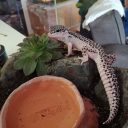
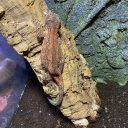
I can only speak for myself, but I am most grateful during this difficult time, to have a veterinarian to depend on when a pet is sick, as was in my case. My cat, Grace Kelly, had a urinary tract infection that within the hour wait I had until the Clinic opened, got progressively worse and she was in distress. After calling the office and being allowed to bring her in and wait in the parking lot until I was called, was more than reasonable, in my opinion. In order to help and oversee our beloved pets, we also have to ensure that the Dr.’s and staff remain safe and protected. I was more than happy to have Gracie taken care of and prescribed medicine and was extremely appreciative, whatever means the Clinic had to take to ensure the safety of their staff and patients!